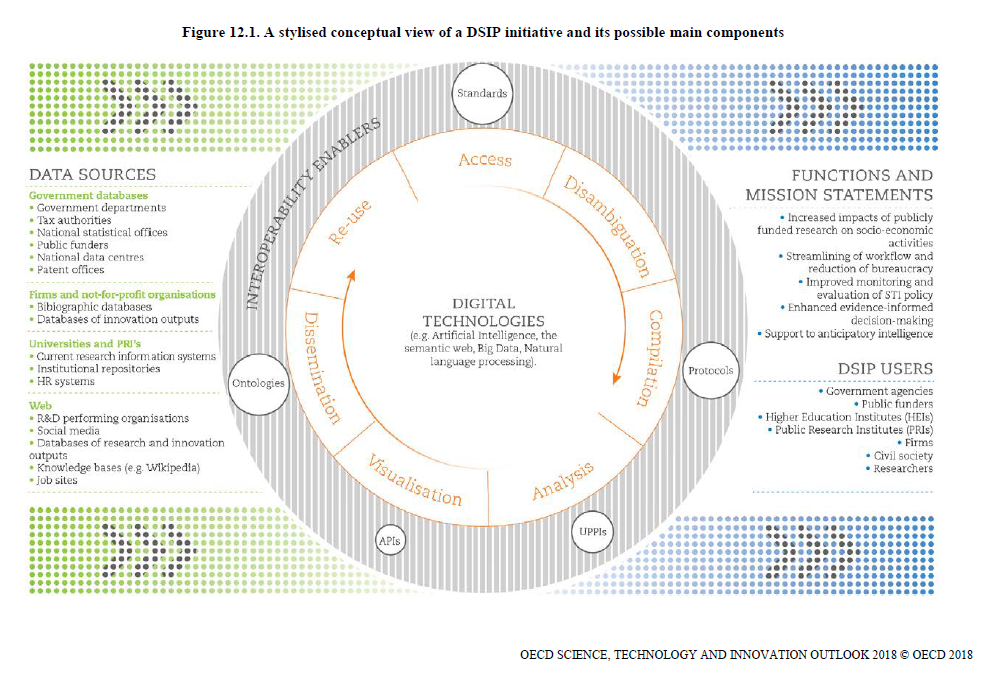Digitalisation of Science and Innovation Policy
OECD experts presented the next issue of the Science, Technology and Innovation Outlook 2018, in which the Russian Intellectual System iFORA, developed by HSE ISSEK (Institute of Statistical Studies and Economics of Knowledge), was referred to as an example of successful initiatives in the field of digital science and innovation policy (DSIP).
.png) | |
| View the document on the OECD website |
The OECD Science, Technology and Innovation Outlook 2018 is the twelfth edition in a series that biennially reviews key trends in science, technology and innovation (STI) policy in OECD countries and a number of major partner economies. This report looks at a range of topics, notably the opportunities and challenges related to enhanced data access, the impacts of artificial intelligence on science and manufacturing, and the influence of digitalisation on research and innovation. The report also discusses the shortcomings of current policy measures, how the Sustainable Development Goals are re-shaping STI policy agendas, and the need for new — more flexible and agile — approaches to technology governance and policy design.
It is particularly important to pay attention to chapter «The digitalisation of science and innovation policy». Emerging digital science and innovation policy (DSIP) initiatives increasingly interconnect various information sources and apply new technologies and applications that allow policy makers to exploit them more extensively. These systems can help build a picture of the incidence and impact of science and innovation activities, providing potentially valuable tools to facilitate decision making across the broad spectrum of STI policy and administration. For instance, ministries can use DSIP systems to design, implement, monitor and evaluate policies. Funding agencies can use them to plan, coordinate, monitor and evaluate their activities. With the growing wealth of data about research and innovation, DSIP systems could transform the ways in which STI policy is defined and public services are delivered.

The primary goal of DSIP initiatives is to support certain aspects of the public policy process, although any actor in the system — including in the private sector — can provide functionalities. The OECD DSIP project is the first attempt at mapping the landscape of DSIP initiatives in OECD member and partner countries. It addresses the highly specific nature of digital government in the area of science and innovation policy. The results of the survey show that DSIP systems come in many shapes and sizes, making it difficult to classify them neatly.
As an example, the review authors cite a group of systems that build on a funding ministry or agency’s administrative databases, linking them to other (typically external) data, e.g. to gain insights on funding outputs and impacts.
They included Argentina’s Scientific and Technical Information System (Argentina’s Sistema de Información de Ciencia y Tecnología Argentino — SICYTAR), the South Africa’s Research Information Management System, The Integrated System of Information on Science and Higher Education — POLon, and Federal RePORTER in the United States.
Another group of DSIP systems consists of analytical solutions (often using machine learning, big data and semantic analysis) that collect and combine data from multiple data sources to provide insights into policy-making.
In the second category, the authors of the review attributed the Corpus Viewer in Spain, Arloesiadur in the United Kingdom, SciREX Policymaking Intelligent Assistant System (SPIAS) in Japan and the Russian Intelligent Big Data Analysis System ( iFORA ), developed at the Institute of Statistical Studies and Economics of Knowledge NRU HSE.
Co-authors of the OECD Science, Technology and Innovation Outlook 2018 are Evgeny Moiseichev, who previously worked at the OECD – HSE Partnership Centre and Dmitry Plekhanov a graduate of the HSE ISSEK Master’s Programme 'Governance of Science, Technology and Innovation'.
